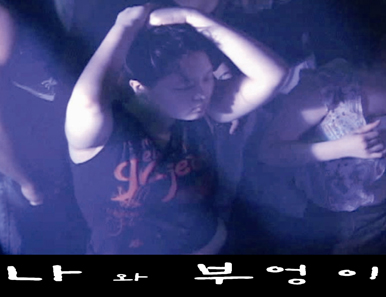South Korea’s “Camptown” Stories
Tonight’s documentary screening reveals plight of sex workers

The documentary Me and an Owl explores the lives of South Korean sex workers who live in the so-called camptowns that developed around U.S. military bases beginning in the 1940s and 1950s. In the film, these camptown women offer their perspectives on the U.S. military presence in their country and on Korean society. By agreeing to show their faces, they have exposed themselves to ridicule and shame, but they also have allowed the audience to see them as real women rather than as unidentified victims, according to filmmaker Kyoung Tae Park.
“The picture introduces the methods of living used by the women of this area, and also it acts as a bridge for the audience to create a possibility of understanding and sympathy for these women,” says director Park, who along with the film’s producer, Youngnim You, will attend a screening of Me and an Owl today, March 22, at Boston University.
The College of Arts and Sciences Women’s Studies Program invited Park and You to BU because the basis of the film dovetails with the program’s emphasis this year on educating students about violence against women.
“After watching the film, we hope students realize what is happening in their global environment,” says Maryam Shahsahebi, program coordinator for the Women’s Studies Program. “Just because it’s not happening in the United States doesn’t mean it’s not happening in the rest of the world. It’s very important for people, especially in the United States, to be aware of what is happening and to try to get involved with stopping violence against women.”
BU Today talked with Seungsook Moon, an associate professor of sociology at Vassar College, who is from South Korea and was instrumental in organizing Park’s and You’s trip from South Korea to several U.S. colleges to speak about the documentary.
BU Today: What is the significance of the title Me and an Owl?
Moon: This documentary introduces several Korean camptown women, and one of them, a 57-year-old former camptown woman, is named In-soon. During one of her art therapy sessions, she drew a picture of herself and an owl and commented that she and the owl would be similar because both of them were working at night.
Who are the camptown women of South Korea?
Camptowns developed soon after the U.S. military arrived in South Korea in 1945. In the 1950s when the U.S. military presence became semipermanent, a cluster of camptowns developed around U.S. military bases throughout the country. Initially, camptown women were daughters of impoverished rural and urban families. These young women were often trafficked into camptown prostitution by gangsters, or ‘employment agencies,’ with the promise of well-paying jobs. Camptown women have been pariahs who occupied the lowest rung of the society. Since the mid 1990s, Korean women in U.S. military camptowns have been rapidly replaced by migrant foreign women, primarily from the Philippines and the former Soviet Union. Camptown club owners prefer these foreign women because they are cheaper and more vulnerable and therefore easier to control. The majority of camptown women in South Korea now are Filipinos and Russians.
How do these women end up as sex workers?
To make a very long and complicated answer short, when we consider their positions in society as young and undereducated women in a gender-segregated structure of the labor market, they have few alternatives.
Why does the United States have military bases in Asia?
During the period of the Cold War, the United States had been building and maintaining a sprawling global network of military bases to protect its political, economic, and ideological interests. Since the end of the Cold War, despite some changes in domestic and overseas bases, it has maintained this global network of military bases. Next to Western Europe, Asia, which is the most populous continent and includes China, and a large part of the former Soviet Union have been considered an important strategic region. The United States has concentrated its forces in Okinawa, Japan, South Korea, and the Philippines. According to 2004 baseline data published by the Department of Defense, despite the shifting geopolitical distribution of the military bases in the post-9/11 era, 66 percent of its 860 overseas bases were still concentrated in three countries, Germany (306 sites), Japan (158 sites), and South Korea (105 sites).
What are the long-term implications of these military bases?
Military bases are usually ambiguous spaces where the sovereignty of a host nation stops and U.S. military personnel enjoy extraterritoriality. While the specific degree to which extraterritoriality is applied varies from one context to another, depending on the specific nature of the power relations between the United States and a host country, it tends to generate a wide range of problems for local people of host countries. Such problems include the distortion of a local economy (e.g., excessive growth of service industries, including the sex industry, at the expense of other industries), the distortion of land use that prevents local communities from developing infrastructure, environmental degradation and destruction (e.g., noise and vibration from military training and regular military operations and the release of chemicals into water and soil), and serious crimes committed against local people by American soldiers.
Me and an Owl will be screened today, March 22, from 5 to 7 p.m. at the College of Communication, Room 101. The event is free and open to the public. For more information, contact the Women’s Studies Program at 617-358-2370, wsp@bu.edu, or www.bu.edu/womenstudies.
Meghan Noé can be reached at mdorney@bu.edu.